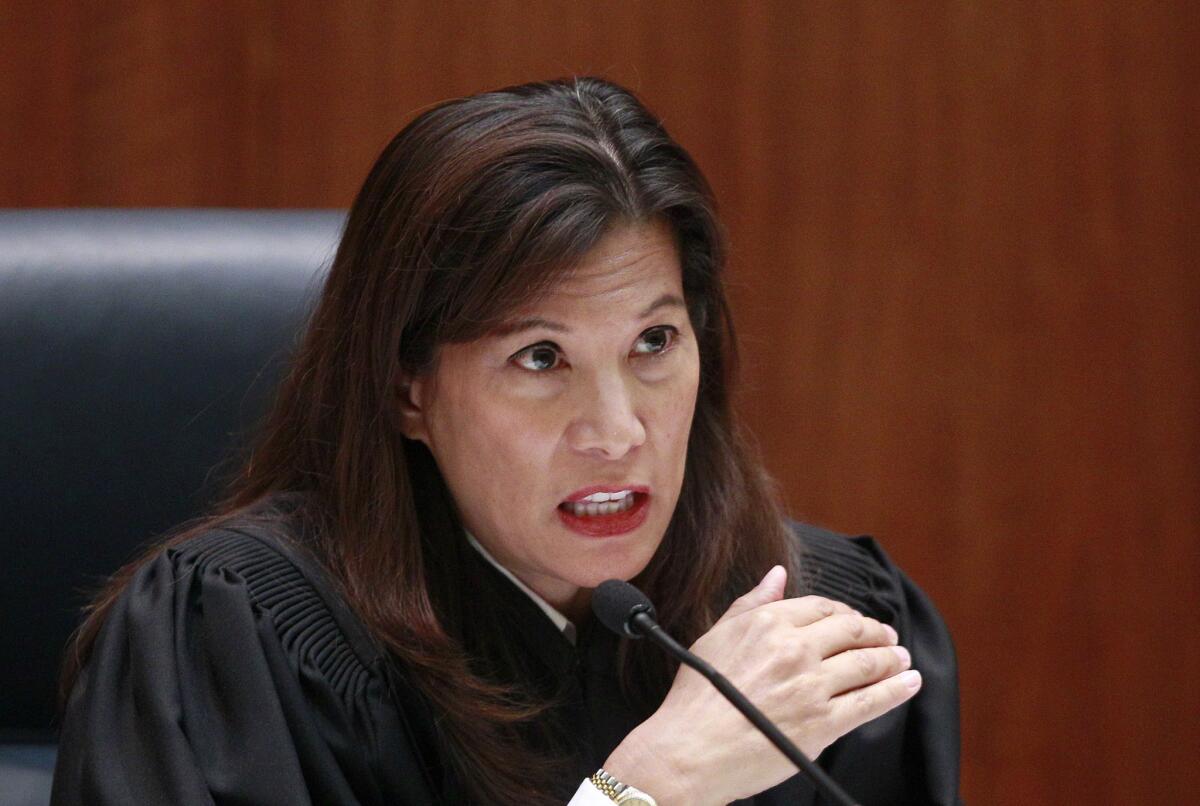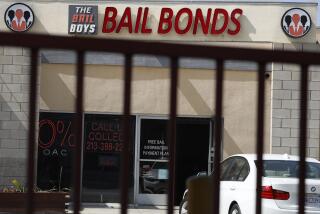Editorial: A $0 bail for Californians accused of nonviolent crimes? That’s exactly the right amount

- Share via
California’s judicial leaders acted wisely when they reset bail amounts temporarily to $0 for people accused of misdemeanors and nonviolent felonies. The decision prevents the dangerous and unnecessary incarceration of defendants who by right ought to be free before their trials, but who instead have been jailed solely because they can’t afford to buy their release on bail. Such needless detention is manifestly unjust in normal times but now is potentially fatal, because inmates by definition cannot be “safer at home” or practice the social distancing and other measures that slow the spread of the coronavirus.
The Judicial Council’s order also offers a marginal level of protection to the inmates who must remain locked up. They are still in grave danger of contracting COVID-19, but the reduced jail population makes some measure of social distancing behind bars more feasible.
Refusing to jail people accused but not convicted of lower-level crimes could yet stave off the horrific scenes now playing out in places such as Chicago’s Cook County jail, which has the largest concentration of infected Americans; New York’s Riker’s Island, where more than 300 are infected; and Washington, Kansas and other states where frightened inmates have rioted over officials’ unconscionable failure to protect them from the deadly virus.
It’s maddening that New York, in the midst of the pandemic, has moved in the opposite direction from California. New York previously adopted a bail reform law that looks in many respects like California’s emergency order, eliminating money bail for people accused of lower-level crimes. But New York’s Legislature rolled back reforms in its recent budget bill, and the state is now keeping in its disease-ridden jails many defendants who have not been convicted of anything — unless they have money for bail. The move will not only cause needless suffering, it may turn a stint at Riker’s Island or other New York jails into a death sentence, even for inmates charged with only low-level crimes, and even if they have not been convicted.
By contrast, the California Judicial Council’s emergency order expands on the dramatic but disputed bail reforms the state Legislature passed in 2018. That legislation, although signed into law, is currently suspended pending a Nov. 3 voter referendum. Unlike the courts’ order, the California bill — SB 10 — would allow pretrial detention to continue, based no longer on the size of the defendant’s bank account but instead on various risk factors as determined by algorithms.
The idea of tying pretrial release to an objective measure of the risk posed by the defendant makes some sense, but the details matter. Criminal justice reformers warn that the algorithms could be poorly constructed or misused in such a way as to perpetuate discrimination based on race or social circumstances, including poverty.
In rural and hard-to-reach areas, postal workers are the only ones who provide regular delivery service.
Still, SB 10 remains a worthy law, even if it leaves the important move toward better pretrial justice incomplete. If voters approve it, California will have finally eliminated wealth and poverty as factors determining whether a defendant goes to jail or remains free. New York’s more sweeping but perhaps less thoughtful law does less good now that it has been sharply scaled back.
Meanwhile, the California emergency order is being attacked by many law enforcement officials and prosecutors. They don’t like $0 bail because of “the blanket release from custody of potentially thousands of inmates,” in the words of an April 11 letter from the California State Sheriffs’ Assn.
Critics conveniently forget that California law has always allowed the release of these inmates — if they have money. In theory, and as provided for by law, bail is set so defendants can pay it, go home, return to their families and their jobs and help prepare their defense, and get their money back when they show up for trial.
But if law enforcement officers, prosecutors and judges are honest about it, they will acknowledge that they often ask for or set bail just high enough that defendants cannot pay it and will be held in jail before trial. That’s simply not permitted by law. Nor should it be. The Judicial Council order temporarily moves the practice in the right direction. Voters will decide in November whether to move forward permanently, albeit less completely. And there will remain plenty of work to be done to fix pretrial detention.
More to Read
A cure for the common opinion
Get thought-provoking perspectives with our weekly newsletter.
You may occasionally receive promotional content from the Los Angeles Times.










